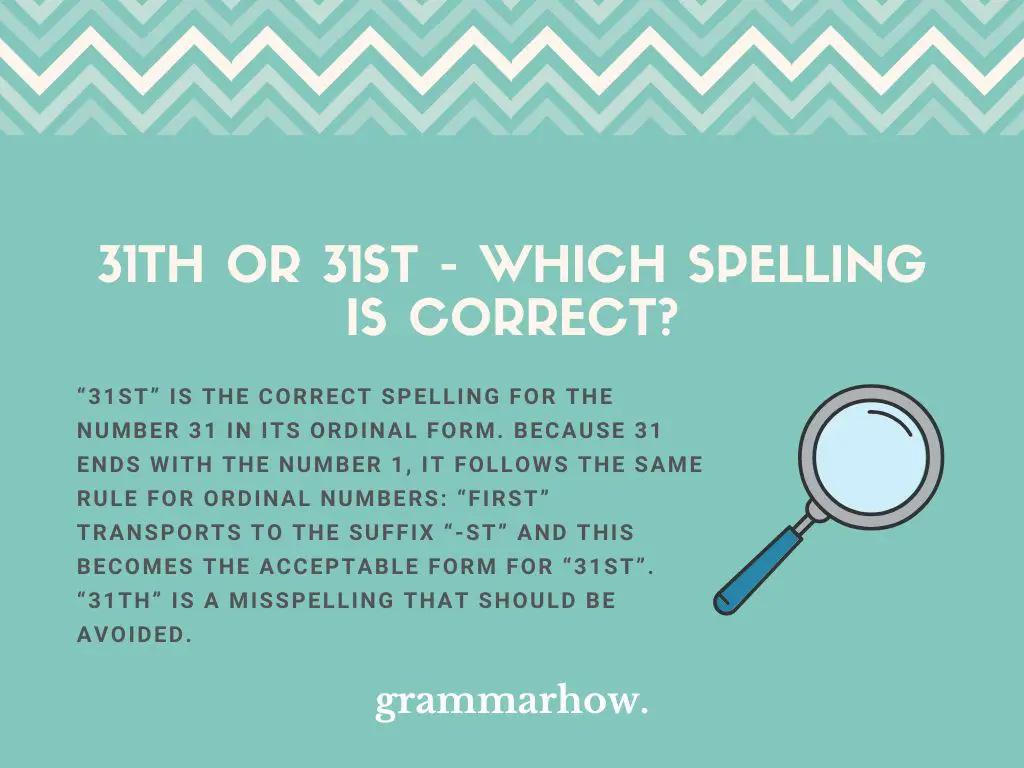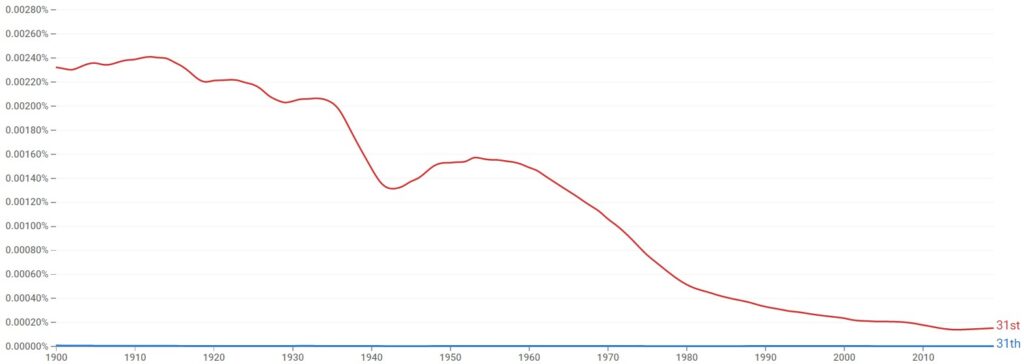How should we spell the number 31 when it is in its ordinal form? Should we use and say “31th” or “31st”?
We want to know which form is considered acceptable to be used and which form we should avoid. Also, let’s find out the rule that defines what’s correct.
31th or 31st – Which Spelling Is Correct?
“31st” is the correct spelling for the number 31 in its ordinal form. Because 31 ends with the number 1, it follows the same rule for ordinal numbers: “First” transports to the suffix “-st” and this becomes the acceptable form for “31st”. “31th” is a misspelling that should be avoided.

Take a look at the examples:
- Paul, happy 31th Birthday! (incorrect)
- Paul, happy 31st Birthday!
“31th” is an incorrect form, because “-th” isn’t the proper suffix to use in most ordinal numbers that end with 1. Just like 1 becomes “1st”, so does “31st”, “21st”, “41st”, etc.
Always use the correct “31st” and avoid using the improper “31th”.
31th
“31th” is an incorrect spelling for the ordinal form of the number 31 and it should be avoided. As you possibly have noticed, “-th” is the most common suffix for ordinal numbers. However, some ordinals are considered to be irregular and, those, have a different suffix attached to them.
Usually, the last two letters of the written form of the ordinal number are carried as a suffix to the numeral version of it. “31th” is incorrect, because its written form is “Thirty-First” and, according to the rule, “-st” should be the suffix to accompany it.
That’s why “31th” is incorrect and “31st” is the form you should use. But is “31th” a word? The answer is no. Although The Cambridge Dictionary doesn’t define either “31st” or “31th”, the only appropriate form to use is “31st”.
Let’s see some examples that include the incorrect form “31th”, followed by a corrected version of the sentence:
- December 31th is New Year’s Eve. (incorrect)
- December 31st is New Year’s Eve.
- Hannah’s birthday is on August 31th. (incorrect)
- Hannah’s birthday is on August 31st.
- I’m leaving for my trip on January 31th. (incorrect)
- I’m leaving for my trip on January 31st.
31st
“31st” is the correct spelling for the ordinal number between 30th and 32nd. “31st” is considered an irregular ordinal number, that doesn’t take on the usual suffix “-th” (as most ordinals do).
“31st” ends with 1. Think for a second about the number 1, as an ordinal number: it’s “First” when written as a word and “1st” when written as a number. In ordinal numbers, the last two letters of the written form become a suffix used to indicate the number is, indeed, ordinal.
Therefore, “First” become “1st”. Likewise, most ordinal numbers that end with 1 carry the suffix “-st”. That’s why “31st” is the correct form, as is “21st”, “41st”, etc.
The Cambridge Dictionary doesn’t have a definition for “31st”. We think it makes sense because “31st” is a number and not a word. That also doesn’t make the form “31st” incorrect, on the contrary. Let’s take a look at some examples:
- Mike’s birthday is on March 31st.
- It’s Janet’s 31st birthday this weekend.
- It’s the 31st day of camp, and we should start packing.
- Some months don’t have a 31st day.
- My 31st birthday was yesterday.
- When I realized was 31st in line I realized it’d take all day.
Which Is Used the Most?
Which one of those forms is used more often, “31th” or “31st”? Take a look at the graph from Google Ngram Viewer below.

“31st” is the spelling that people use more often – as they should because this is the correct form that is acceptable to be applied to indicate the ordinal form of the number 31.
On the other hand, “31th” is rarely used. Since it’s an incorrect form, this is also what we expected the graph would show.
Final Thoughts
“31st” correctly indicates the number 31 when it needs to appear as an ordinal number. The number 31 follows the same rule for ordinal numbers as the number 1: “First” generates the suffix “-st”. “31st” is correct and “31th” should be avoided.

Martin holds a Master’s degree in Finance and International Business. He has six years of experience in professional communication with clients, executives, and colleagues. Furthermore, he has teaching experience from Aarhus University. Martin has been featured as an expert in communication and teaching on Forbes and Shopify. Read more about Martin here.
